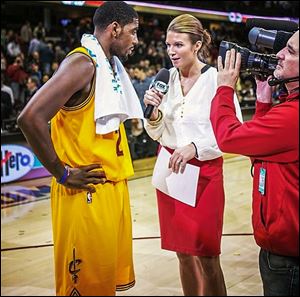
Ex-Rocket changed direction of her career
Clifton a sideline reporter for Fox Sports Ohio
4/20/2014
Allie Clifton of Fox Sports Ohio interviews Kyrie Irving of the Cleveland Cavaliers. Clifton, a former UT basketball player, decided late in college to pursue TV work instead of teaching.
Allie Clifton studied education in her first three years at the University of Toledo but realized that her career path wasn’t going to be in teaching — an awareness that dawned on the basketball player the day before her final semester of college.
Her decision was even more difficult given that she is from a family of educators including her father, a school administrator.
“I finally talked to my parents about it and told them that basketball was coming to an end, but I also wanted to know how I could continue in the game,” said Clifton, who is in her second season as the Cleveland Cavaliers’ sideline reporter for Fox Sports Ohio.
Clifton didn’t take the typical path to a career — she returned to Toledo after graduating to pursue her master’s degree. While a light bulb may go off in the heads of some athletes as to what their future may hold after graduation, for others, it might be a process of trial-and-error.
Clifton didn’t gain work experience until she worked on her master’s degree. She worked at Buckeye Cable Sports Network as a commentator and interned at WTOL for two semesters. After she completed her master’s in liberal studies, she joined the staff at WTVG before joining Fox Sports Ohio in August of 2012.
“There’s not a right or a wrong way to do it,” Clifton said. “Sometimes you have to carve your own way out.”
As an undergraduate, Clifton regularly met with academic advisers who would assist with resume writing and career networking, as well as offer a network of professionals whom student-athletes could speak with when it came to pursuing a career after college athletics.
“They would tell us, ‘you’re a student first, Find a way to use that degree,’” Clifton said. “It was really about learning how to manage life outside of your sport, and how to make sure those skills are still there when playing sports is all over.”
When it came to making the transition from football player to college graduate and an employment-seeker, Peter Winovich went with what was inherent to him.
“I looked at my core beliefs,” said Winovich, a former Bowling Green football player who earned a bachelor’s degree in financial economics. “I wanted to help people. I wanted to be an adviser. That’s where I really benefited as an athlete. I looked for opportunities for that, and I knew I enjoyed financial economics, so that was a great bridge. And I knew I wanted to stay close to Bowling Green and maintain that connection.”
But when it came to being a football player, Winovich said, “student-athletes have to learn a lot faster. They don’t have the same opportunities to find their own identity or what they want their career to be. They’re focused on being the best athlete they can be, and sometimes you have a very small amount of time to find what you’re looking for.”
In the Michigan Professional and Career Transition program (M-PACT), student-athletes sit down for what director Shari Acho calls a “discovery phase,” in which they identify what their interests or passions are, as well as take an assessment of career inventory and personality tests.
While at Michigan, student-athletes are matched with internships and part-time jobs, take job-shadowing assignments, attend career networking sessions, and are taught to cultivate and maintain relationships with professionals — not just professional athletes.
“When I started this, I remember thinking, ‘well, it’s the football players who really need this,” said Acho, who was an academic counselor at Michigan State and at Michigan before beginning M-PACT four years ago.
“You look at some of the kids now and you think, wow, they’re incredible athletes. But then they come to you and ask, ‘what do I do now?’ ”
The biggest challenge in this process, said Kerry Jones, is for an athlete to reach the point where he or she realizes, “I may not be an athlete forever.”
“I see it happen between somewhere in the sophomore or junior year,” said Jones, the BG director of student-athlete services. “The first year after an athlete is recruited, they might see, well, maybe I’m not getting as much playing time as I thought, or maybe I’m not performing as I thought. Or maybe they think, maybe I don’t want to be a coach.
“Maybe I need to start thinking a little more seriously about what I need to do or what I want to do after school.”
Contact Rachel Lenzi at: rlenzi@theblade.com, 419-724-6510, or on Twitter @RLenziBlade.